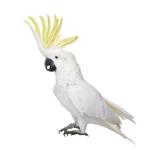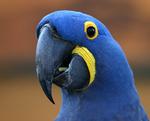Stop Ya Squarking!! (continued)
Night-time Curfew
Give it toys to play with. One range of bird toys goes by the name of ‘Jungle Talk’. They are available from your veterinarian and pet shop and are super bird toys! Kong Toys also work well for birds.
You can you train your bird to be quiet but it takes a bit of patience. Some pet birds get over attached to their owners. I have seen several that cannot tolerate being out of their owner’s sight. Sometimes the only way such tormented bird owners can keep their feather duster silent is to have it sitting on their shoulder continuously. This is a self-fulfilling prophecy – the more they allow the bird to ‘win’ by placing it on their shoulder, the more the bird will demand this attention.
The solution is to distract the bird when it is noisy, and then to praise the resulting quiet behaviour. A few tricks will help. Your bird needs to think that the distraction has nothing to do with you.
Seeing the Light and Fan Fare

It’s similar at dusk. The birds are going home to roost, they chatter about the day’s events, catch up on current affairs and then settle in for the night with cuddles and kisses all around.
Part of the solution to this behaviour is to reduce your bird’s exposure to these other birds. Try covering the cage or having and a ‘bedroom’ cage for your feathered foe inside the garage or house.
A Rich Lifestyle
What about creature comforts? You can’t expect a bird to be happy in a minuscule cage that is hardly bigger than the bird’s wingspan. If the cage is in a hot, cold or windy location, your bird certainly has the right to complain too. Some folk have a comfortable cage which is in the shade in the morning but as the sun moves, the cage is torched by the afternoon sun later in the day. That’s sure to create belligerent bird behaviour.
Giving a variety of food is useful too. Vary your birds diet and give is some environmental enrichment by providing nutritious bird snacks such as pieces of fresh fruit and vegetables. Cockatoos love destroying things, so through out the refined dowel perches and let it destroy a few gnarled and ugly tree branches from native Aussie trees.


If you want to be a bit more elaborate, get a remote door bell from the supermarket and carry the door bell button in your pocket. Place the bell adjacent to the cage. As soon as squarking occurs, press the button to activate the door bell. Reward any resultant silence as before.
Using this method, the attention is for being quiet, not for being noisy.
You can also try the ‘Bad Bird – Good Bird Technique’. As soon as squarking occurs, yell a gruff ‘QUIET’, wait for silence for five to ten seconds and then, in a sweet, sooky voice praise your paranoid parrot saying ‘GOOD BIRD’ or whatever else you feel is appropriate. Now see if that has purchased you a longer period of silence. If it has, go to the bird as before and give it the attention it wanted
Timing is vitally important. Immediate distraction or soft discipline is essential. If you leave the squawker to screech for too long, it has reinforced its own wrongful behaviour.
One last word – be careful what you teach your parrot to say. If you teach it phrases that are embarrassing, remember that a cockatoo can live for 50 to 70 years. That’s a long time to put up with profound parrot profanities!
